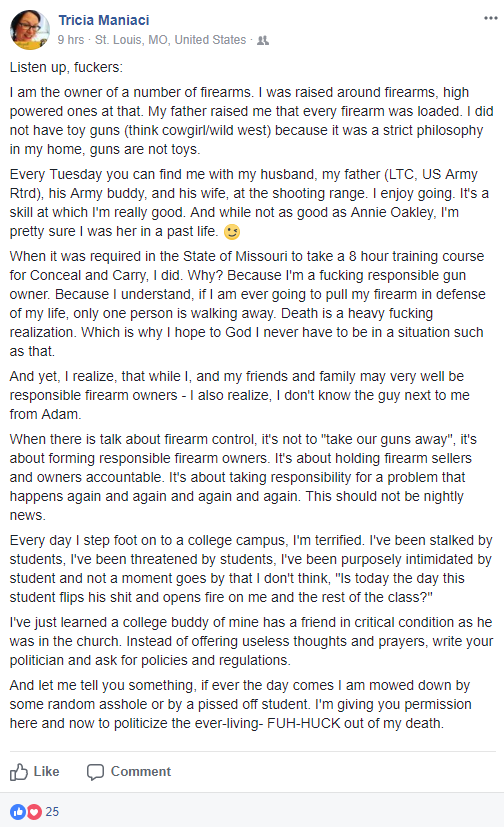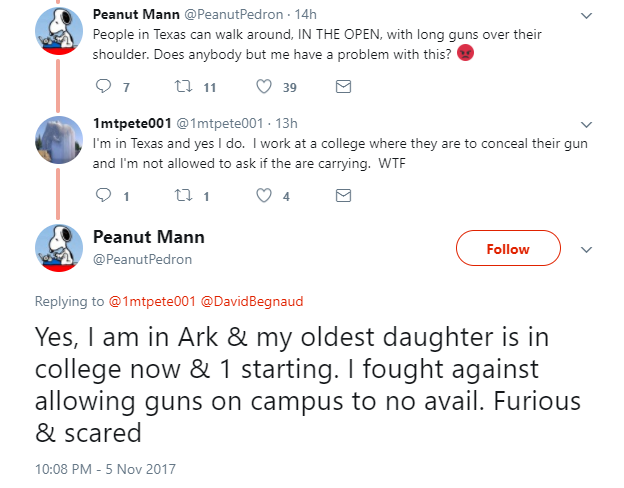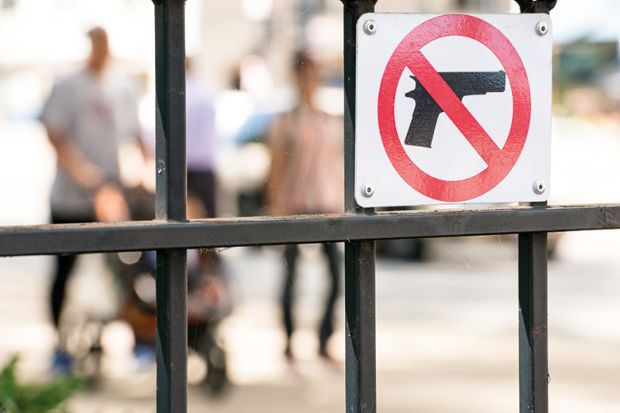"Every day I step foot on to a college campus, I'm terrified. I've been stalked by students, I've been threatened by students, I've been purposely intimidated by student[s] and not a moment goes by that I don't think, 'Is today the day this student flips his shit and opens fire on me and the rest of the class?'"
These words, written by Patricia Maniaci, an adjunct English professor at a university in the US Midwest, were shared on Facebook in the aftermath of the Sutherland Springs shooting, in which a gunman killed at least 26 people at a Texas church.
"I've just learned a college buddy of mine has a friend in critical condition as he was in the church," she continues. "Instead of offering useless thoughts and prayers, write your politician and ask for policies and regulations. And let me tell you something, if ever the day comes I am mowed down by some random asshole or by a pissed off student. I'm giving you permission here and now to politicize the ever-living- FUH-HUCK out of my death."
Here's her Facebook post in full.

I have have spoken to Ms Maniaci about sharing this post. She clarified that the politicisation of her hypothetical death would be to further the debate about gun controls (which she feels should be tighter, but not to the extent of an outright ban). I also asked for her thoughts on a number of related issues, including whether students be allowed to carry guns on campus – concealed or otherwise?
"Open carry [whereby guns can be carried without being concealed] anywhere is the stupidest thing anyone could ever do, unless you are out in the wilds of Montana or in the woods where a bear or wild cat attack is a possibility," she said. "Unless you are someone in law enforcement, put the gun away, because now you are a target. And unless you are highly trained to react in situations that would call for you to use your gun it's useless. It really is."
And does she bring her firearm on to campus? "No," she says, pointing out that she believes the "majority of campus security officers are armed" should there be an incident (although she also mentioned research suggesting that the body count for a campus shooter situation would likely be higher with armed campus guards than if they were not carrying firearms).
To readers outside the US – and particularly in the UK – the idea of allowing university students (and staff) to walk the corridors with a gun hidden on their person seems, frankly, absurd. It is not a concept that is particularly ingrained in US culture either; indeed, at the turn of the century, no US states had laws that allowed the carrying of a firearm on a college campus. Things changed in the year 2004, however, when Utah became the first state to permit guns on campus.
At the moment, 11 states allow concealed guns to be carried on campus by law. They are: Arkansas, Colorado, Idaho, Kansas, Mississippi, Ohio, Oregon, Tennessee, Texas, Utah and Wisconsin. Nine states allow guns only in locked cars in campus car parks; 20 states leave it up to individual universities and colleges to decide their gun rules; and 10 states prohibit firearms on campus by law.
Perhaps unsurprisingly, there have been multiple shooting and gun-related incidents at universities in those states that permit, by law, the carrying of weapons on campus. According to the Campaign to Keep Guns Off Campus, in the past two years alone these include:
- Man found dead in a University of Northern Colorado campus parking lot with a self-inflicted gunshot wound (20 August 2016)
- Eighteen-year-old track team member arrested for discharging a gun in a campus dorm room at the University of North Florida (1 September 2017)
- Kennesaw State University student robbed at gunpoint in the parking lot of a residential building. The student had his wallet and gun stolen (25 July 2017)
- Georgia Tech student openly carrying a knife shot and killed by campus police after calling 911 saying there was someone with a gun on campus (16 Septembe 2017)
- A man shot and killed himself in the Arboretum at the University of Idaho (3 July 2017)
- University employee found a handgun in the restroom of a campus building at Wichita State University (14 July 2017)
- Newly arrived student found a backpack with a knife, gun magazines and ammunition at the University of Kansas (5 September 2017)
- Loaded revolver found in the men’s restroom at Wichita State University. Weapon originally reported stolen from another building on campus (19 August 2017)
- Former student was shot and injured in the parking lot of a campus dorm room at Tennessee State University (5 September 2017)
- Concealed carry permit holder accidentally discharged his firearm in his room at Tarleton State University (15 September 2016)
- Licensed gun holder negligently discharged firearm in his dorm room while showing the weapon to his friend at Texas A&M University (1 September 2017)
- A 19-year-old Texas Tech University student shot and killed a police officer at the police department after he was brought in for a welfare check (9 October 2017)
- Utah Valley University student (with valid concealed carry permit) accidentally discharged his gun in the campus food court (25 April 2017)
Clearly these incidents range from the very serious, where life has been lost, to the less serious (although when the least troubling incident on a list involves the discovery of firearms and knives, that puts the scale somewhat in perspective). Nonetheless, they all raise questions about why individuals who are not trusted to purchase alcohol are permitted to walk around college with a gun (a slightly hackneyed observation I'll grant you – but factual nonetheless).
Being from the UK, it is hard for me to look beyond the Westminster government's response to the 1996 Dunblane massacre, in which gunman Thomas Hamilton killed 16 children and one teacher before killing himself. This incident led to the banning of all cartridge ammunition handguns in England, Scotland and Wales.
Needless to say, the UK does not have a significant problem with gun crime. And it would be unfair to say that in the aftermath of any high profile US mass-shooting (defined as taking the lives of at least four people, and of which there have now been 307 in 2017) that there is not a very public and passionate debate about gun law reform.
However, as we know, jumping immediately to an outright ban on guns is not a response that would hold much water in the US. The widely quoted argument from National Rifle Association executive vice-president Wayne LaPierre – that “the only way to stop a bad guy with a gun is with a good guy with a gun” – is one that convinces many (despite strong arguments against this rationale, notably from Harvard University). For some – including the Students for Concealed Carry movement – this line of thinking extends into universities.
The Texas chapter of this organisation, which describes itself as "student-run, national, non-partisan organisation which advocates for legal concealed carry on college campuses in the United States as an effective means of self defense", was itself active on social media in the wake of Sutherland Springs. Its representatives were busy trying to put concerned students at ease about the presence of firearms – including this one (who in a later tweet corrected "open carry" to "concealed carry", which is the current state of affairs):
This is in Texas. Where open carry is allowed on campus and most people have guns. I don’t feel any safer knowing that.
— Nicole Y.❄️ (@uloveny) November 6, 2017
The Students for Concealed Carry account was quick to respond (including with the correction from "open" to "concealed), sending a string of tweets.
#CampusCarry won't prevent all mass shootings, but it may afford an individual the means to defend himself or herself if caught in one.
— TXSCC (Campus Carry) (@CampusCarry) November 6, 2017
Look at the Virginia Tech and NIU shootings, in which surviving victims reported watching from nearby hiding places as the gunmen reloaded.
— TXSCC (Campus Carry) (@CampusCarry) November 6, 2017
Look at the VT professor who died while barricading the door with his body, so that his students could escape through a window.
— TXSCC (Campus Carry) (@CampusCarry) November 6, 2017
Look at the Pulse nightclub victim who took cover in a bathroom and texted his mother that he loved her, before being shot and killed.
— TXSCC (Campus Carry) (@CampusCarry) November 6, 2017
The suggestion is that, had each of these unfortunate individuals been armed themselves, then they may have been able to act more aggressively in order to put a stop to the shootings in which they were involved.
A handgun MIGHT have helped those people. There's no grantee, but it's naive to declare that a "concealed carry weapon isn't going to help."
— TXSCC (Campus Carry) (@CampusCarry) November 6, 2017
There is no doubt that this logic will have its supporters, both on university campuses and in the wider world. However, there is also no doubt that people with students at universities where guns are legally allowed to be carried are scared – be they staff, students or parents, as the tweets below, also sent just after Sutherland Springs, demonstrate.

This blog does not attempt to take a side on this issue. I state openly that I am vehemently opposed to the ownership of automatic weapons, and can see no reason whatsoever why students or staff should be permitted to carry firearms on a university campus. Indeed, were my son of university age and I lived in one of the 11 states that permit concealed carry on campus, I would be strongly encouraging him to go out of state for his higher education.
However, I also acknowledge that the US starts from a very different place to the UK. I only hope that this latest incident at least furthers the dialogue about gun laws, even if the initial response from the man arguably most able to influence any reforms is less than encouraging.
Asked whether gun control is "the answer" after Texas shooting, Pres. Trump responds, "This is a mental health problem at the highest level" pic.twitter.com/UsUP4oSHVy
— ABC News (@ABC) November 6, 2017
Las Vegas shootings prompt calls for US to fund gun violence studies
How much research is done on gun violence in the US?
Presidents take on the gun lobby




